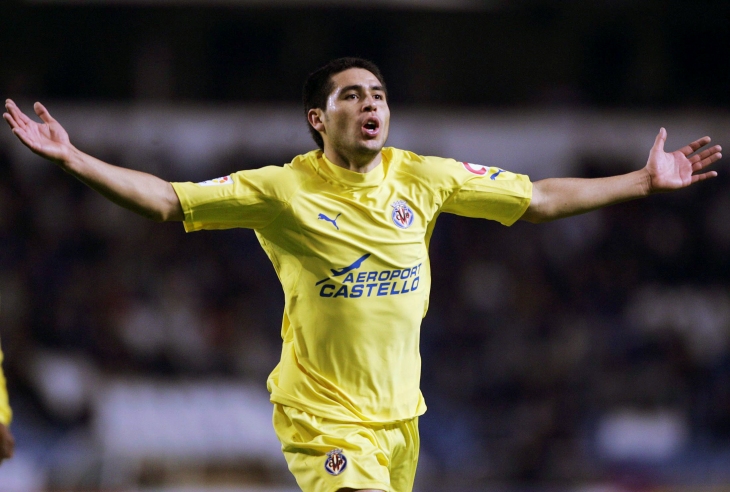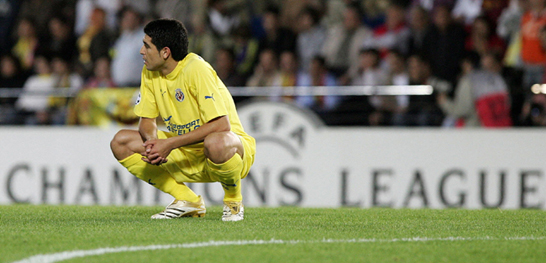Around nine years ago or so, I was on holiday in Sitges, just outside Barcelona. As is my wont at such times, I was sitting outside a bar with a cold beer whilst the wife had gone off shopping. Relaxing in the Catalan sunshine, I was reading – well reading may be too strong a word, but my fractured Spanish just allows me to understand every third word or so, so I can grasp the essence of the story – a copy of ‘Sport’, a local newspaper that covers football, and predominantly FC Barcelona.
The headline on the front page concerned Juan Roman Riquelme. The Argentine had been signed for the Blaugrana but, after a season being largely ignored by then manager Louis van Gaal, had been loaned out to Villareal. The loan deal was now coming to an end, and the club had to decide what to do with the maverick Argentine playmaker. A sale to Villareal would have been ideal, but there was no way the small-town club could afford any realistic transfer fee, let alone match the player’s Barcelona wages.Barcelona had now also signed Ronaldinho, and with their quota of foreign players filled, there was no place for Riquelme. The headline said “Riquelme: A transfer that must happen” in Spanish you understand, of course.
I remember the incident well, as a waiter, quickly identifying me as a football fan, started chatting about the player. A Barcelona ‘cule’ he said that the club simply had to transfer him to Villareal, regardless of the cost. We chatted for a while and then he said, “An artist. Great style. But we want to win.” I wasn’t too familiar with Riquelme’s play before then, but the phrase stuck in my mind. Sure enough, the clubs came to an agreement, including some kind of sell-on clause, and Riquelme moved to the Valencian club. It may have been the shrewdest bit of business the ‘Yellow Submarine’ ever conducted.
At the time, the club was managed by Manuel Pellegrini who was canny enough to also recognise that Riquelme was an artist. Not a player to be locked into a rigid team structure, but one who would reward a freedom to play with the sort of performances that would delight fans, prising open defences with exquisite play. Later that same year Villareal qualified for the knockout stages of the Champions League, eliminating Manchester United in the group stage.

Riquelme’s time with Villareal saw the ‘Yellow Submarine’ become a force in La Liga and reach the semi-finals of the Champions League
Inspired by Riquelme, they progressed to the semi-final where they faced Arsenal. Trailing by a single goal from the game at Highbury, the Spanish team could not unlock the Gunners defence in the home leg, until a late penalty was awarded to them. Up stepped Riquelme, with confidence, but without swagger, to send the game into extra time. Jens Lehmann leapt across his goal however and parried the ball away. Arsenal held on for the 0-0 draw and Villareal were eliminated. When the final whistle went the cameras panned to the Argentine in an ‘if only’ sort of moment. My mind went back to the waiter at the bar. All season long, Riquelme had encouraged his over-performing team, prodding and cajoling with elegant play to produce results that were probably beyond them by any realistic measure.
Villareal’s season had been one of those rare occasions when one part of a team made the output of the whole unit much greater than it would have been by drawing an increased quality from his team-mates. It was a time to celebrate the artist and the pictures he had conjured up for his club, rather than looking at any sad denouement. The beauty was in the journey, not in the arrival. My mind went back to the waiter at the bar in Sitges and a line in the Don McLean song about Vincent van Gogh. With apologies to the american singer, the line targeted at Riquelme could have read “They should have told you, Juan Roman, football was never meant for someone with play as beautiful as yours.”
A consideration of the end of a Riquelme tale is particularly relevant at the moment, as the player announced his retirement a few weeks ago. When I read an article by the famous Uruguayan journalist, Eduardo Galleano, following the retirement announcement, it quickly became clear that likening Riquelme to an artist was not an uncommon thread. Galleano wrote that Riquelme, was an rebel who had performed with grace and elegance in a time when the game “has managed to impose a football of lightning speed and brute strength, a football that negates skill, kills fantasy and outlaws daring.” The player himself seemed to echo Galleano’s thoughts in his retirement speech, describing himself as someone “who makes decisions calmly, who thinks a lot.” Rebel with a pause indeed.
Former Argentine forward, coach and General Manager at Real Madrid described summed up Riquelme with a neat turn of phrase. He declared that “If we have to travel from A to B, most of us take the six-lane highway and get there as quickly as possible. Riquelme would choose the winding mountain road, the scenic route which takes him six hours instead of two.” The player himself would surely not disagree. He once pondered, ‘Why simply accomplish when one can create something beautiful?’
I’ve particularly avoided listing the trophy haul that the Argentine accumulated over his 18 year career. There were more than a few, but for someone who emphasised the journey rather than the arrival, focusing on that particular element is surely more apposite.
There was always something of the sepia about Riquelme, as if he should have played in another era. Perhaps a time when the requirements at the top of the game, were less focused on the athletic and muscular approach, and more on the skill and artistry of a player. Even in such times however, football is a poorer game for the loss of such a player, and even more for the failure to recognise an artist who painted beautiful pictures.
(This All Blue Daze article was originally produced for the ‘offsiderulepodcast’ website).
References:
- https://uk.eurosport.yahoo.com/blogs/pitchside-europe/juan-roman-riquelme–an-artist-imprisoned-in-a-world-of-athletes-144631477.html
- http://canchallena.lanacion.com.ar/m1/1763062-riquelme-retiro-del-futbol
- http://www.fcbarcelona.com/football/first-team/detail/article/juan-roman-riquelme-announces-retirement
- http://www.espnfc.com/blog/espn-fc-united-blog/68/post/2265758/juan-roman-riquelme-the-master-of-his-art-will-be-missed-by-argentina


I pay a visit daily some sites and information sites to read
articles or reviews, but this blog gives quality based posts.
LikeLike